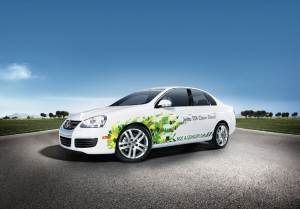
Volkswagen is betting its expanding diesel line-up will help it reach its goal of 800,000 sales, in the U.S., by 2018.
While industry leaders continue to hedge and debate the potential for diesels in the U.S. market, it’s full-speed ahead for Volkswagen of America.
The German maker’s diesel-powered products continue to gain ground, encouraging VW to add the powertrain as an option on even more of its models, going forward, said Stephan Jacoby, CEO of Volkswagen of America.
“With any new vehicle that arrives with a diesel option,” said the executive, during a speech at the annual Automotive News World Congress, “we estimate 20 to 30% of the mix will be diesel.”
Jacoby suggested that American “consumers more and more understand diesel,” something that not be true for those in the auto industry. The potential overall market acceptance of the high-mileage technology “depends on whether other makers will follow,” said the German executive. So far, though, the Germans to be the only makers taking a serious stab at rebuilding the American market for “oil burners.”
“I think the fair diesel going forward,” concluded Volkswagen’s CEO, “will be around 5%.”
Diesels were a pillar for VW in the devastating downturn of 2009, letting it actually gain a bit of market share. Like his colleagues throughout the industry, Jacoby made it clear he is happy to welcome in the New Year. “We can all be glad to see 2009 in the rearview mirror,” he said with just a slight laugh.
The automaker has an aggressive plan for the coming decade, hoping to bring its volumes up to 800,000 by 2018. Adding new product and launching a new assembly plant, in Chattanooga, will help, said Jacoby.
With the new assembly line, VW will be producing 85% of the vehicles sold in North America at plants based in the three NAFTA nations, up from 63% today. (That figure, of course, doesn’t reflect the fact that significant componentry will still be sourced from the Euro zone.)
Rebuilding demand, which has lagged in recent years, won’t be easy, Jacoby suggested. Among other things, VWoA will have to shift away from simply marketing products designed for European consumers. The brand will have to deliver “other products which fit with the American consumer,” he said.
Another challenge is reversing the brands image problem, Jacoby acknowledged. “Our weakness in the United States,” he said, “is the perception of American consumers concerning quality and reliability.”
The automaker has been struggling to fix those issues, but executives like Jacoby are well aware that perception typically lags reality. But with independent arbiters, like Consumer Reports magazine, starting to give good reviews and buy recommendations to Volkswagen product, Jacoby is hoping that perception and reality will start mirroring one another.
